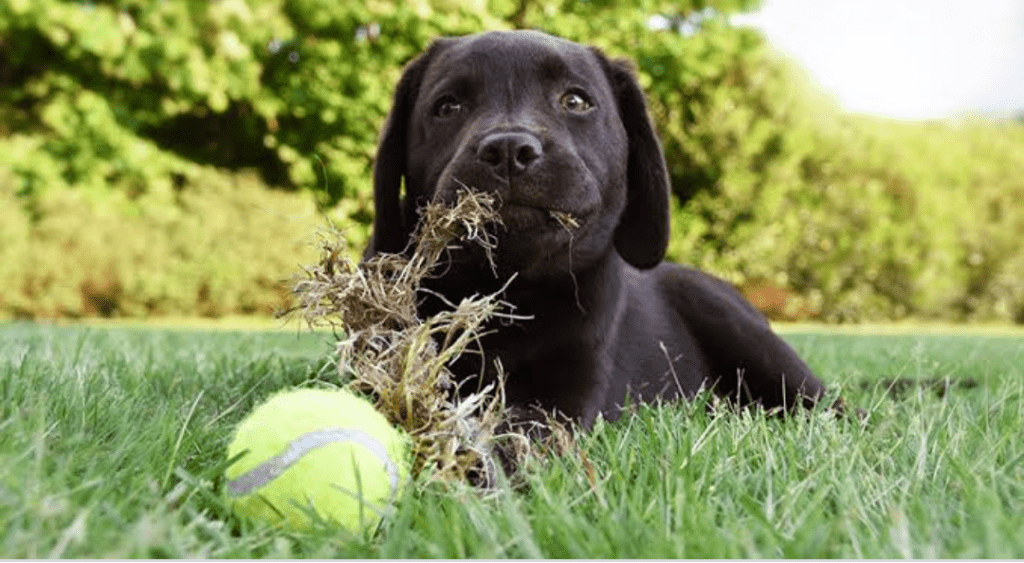Is your dog eating grass and vomiting afterwards? Are you wondering if it is normal or not? Don’t worry you are not alone. Most dog owners have these queries, if it is unusual that their dog feeds on grass. Keep on reading this article to know the possible reasons and solutions.
Possible Reasons for Labrador Eating Grass
- He is bored
Younger dogs eat grass out of boredom quite exactly like people bite their nails mindlessly. It is a normal dog behaviour according to some veterinarians but it can be an issue in some situations.
- Disorder
Pica is the technical term for this disorder of eating things that are not food. Sometimes, it means that you’re dog has some type of nutritional deficiency.
- Upset Stomach
Remember when you wanted to vomit just to relieve your upset stomach. There’s a similar theory for dogs as well, that they graze just to throw up. But again there’s not enough evidence to prove this theory.
- For that fiber
There’s also a possibility that dogs eat grass to get the nutrients from it as it is high in fiber, for example, spring grass is rich in nutrients.
- Lab just likes it
Last and simple reason could be that your labrador just likes the taste of grass. It is readily available to him and it is not poisonous, which is probably why he is adding this roughage in his diet.
- Inherited trait
In an article written by Benjamin L. Hart in 2008, he describes that most dogs and cats consume plants and it is okay for them to do so. Consuming plants is not associated with illness and it can simply be a trait from their wild ancestors. Animals like chimpanzees eat whole leaves because it increases their immunity and helps them in fighting with those intestinal parasites which are actively growing in their bodies. Young animals eat more plants as their less immuned bodies are prone to be attacked by nematodes.
Is it Safe?
In most cases, yes it is safe. Just make sure that your dog is not facing any other illness. Still if you want to control his grazing or the amount of grass he is chewing, below are some ways to do that:
How to control his grazing
- Start working out
Physical exercise can be the solution. Labradors should get exercise on a daily basis for an hour or so when they are healthy adults.
- Craving Fiber
As mentioned above, the possible reason your canine buddy is chewing grass is to complete his nutritional intake. To solve this problem, try giving food that are high in fiber. Some essential fibers he will be craving for are here,
- Bran – It is the outer shell of a grain and removed during processing.
- Vegetables – Carrot, peas, beans are high in fiber. They will satisfy his fiber needs.
- Brown rice – You will be surprised to know that brown rice has three times fiber than white rice. Not just your dog but you should ditch white rice and be friends with brown rice. Stop being racist and start consuming brown rice.
Dogs do not derive any energy from fiber but it helps them to maintain a healthy weight, adding fiber to food helps with diarrhea, improving colon and diabetes mellitus.
- Distract him
Have you tried distracting him? It may sound stupid but it can work. Try throwing a frisbee at him or any game that both of you like playing. You can even give him something else to chew on, a toy for example.
- Teach him to come to you
The best thing you can do is train him to come to you, this way you can prevent his grazing next time. This will solve so many other problems as well that you might be facing with your dog.
- Time to visit the Vet
Last suggestion would be to just take him to see his vet. An expert advice definitely will be helpful to stop this habit.
Things to keep in mind
- Pesticides in the grass can be the problem.
- Dogs eating grass is not actually a big problem in most of the situations. In plant eating dogs, most commonly eaten plant is grass but just be sure that grass doesn’t have any harmful pesticides. In this case your labrador is chewing on the grass with pesticides in it and I don’t have to tell you that will be a serious problem.
2. Keep tabs on fiber intake
Do not add too much fiber because it can lead to loose motions and bloating.
3. Remove Toxic Plants
Get rid of toxic plants like poisonous mushrooms from your lawn if your labrador feeds on grass.
Table of Contents

